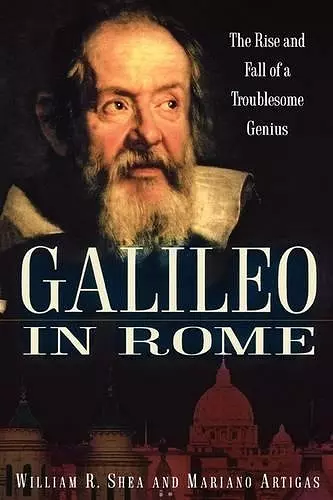Galileo in Rome
The Rise and Fall of a Troublesome Genius
Mariano Artigas author William R Shea author
Format:Paperback
Publisher:Oxford University Press Inc
Published:21st Oct '04
Currently unavailable, and unfortunately no date known when it will be back

Galileo's trial by the Inquisition is one of the most dramatic incidents in the history of science and religion. Today, we tend to see this event in black and white--Galileo all white, the Church all black. Galileo in Rome presents a much more nuanced account of Galileo's relationship with Rome. The book offers a fascinating account of the six trips Galileo made to Rome, from his first visit at age 23, as an unemployed mathematician, to his final fateful journey to face the Inquisition. The authors reveal why the theory that the Earth revolves around the Sun, set forth in Galileo's Dialogue, stirred a hornet's nest of theological issues, and they argue that, despite these issues, the Church might have accepted Copernicus if there had been solid proof. More interesting, they show how Galileo dug his own grave. To get the imprimatur, he brought political pressure to bear on the Roman Censor. He disobeyed a Church order not to teach the heliocentric theory. And he had a character named Simplicio (which in Italian sounds like simpleton) raise the same objections to heliocentrism that the Pope had raised with Galileo. The authors show that throughout the trial, until the final sentence and abjuration, the Church treated Galileo with great deference, and once he was declared guilty commuted his sentence to house arrest. Here then is a unique look at the life of Galileo as well as a strikingly different view of an event that has come to epitomize the Church's supposed antagonism toward science.
Galileo in Rome represents the finest in modern Galileo scholarship. * Stephen M. Barr, First Things *
In their very readable, clear, and concise accounting of Galileo's life and trial, the authors concentrate on the six visits that Galileo made to Rome, exploring what happened during those visits, the theological and political reasons behind them, and their ramifications.... Most accessible...highly recommended for academic and public library collections. * Library Journal *
Drawing on a wealth of letters and archives, the authors construct a nuanced portrait of the complex web of political and religious institutional forces that constituted 17th-century Rome, showing that the trial of Galileo was as much the product of tension between the pope and the grand duke of Tuscany (Galileo's patron) and of Galileo's arrogance when dealing with Jesuit astronomers as it was a result of the oppressive Inquisition. * Publishers Weekly *
In recounting the actual people with whom Galileo fenced, as well as the theological doctrines involved, the authors demythologize the man. Their criticism makes Galileo as interesting a figure as ever. * Booklist *
A brilliant book about Galileo's six epochal trips to Rome. It will remain the most accessible and authoritative account of his relations with the Church in the years of his greatest discoveries. * David Freedberg, author of The Eye of the Lynx: Galileo, His Friends, and the Beginnings of Modern Natural History *
Lucid and elegantly balanced, this story of Galileo's trials edges the Church into a fairer light. * Lauro Martines, author of April Blood: Florence and the Plot Against the Medici *
This is a lively and persuasive re-telling of the story of Galileo's life and career. It is in the details that issues of interpretation constantly arise, but the authors have navigated the subject's minefields in convincing fashion. A readable and authoritative piece of work. * Theodore K. Rabb, author of Renaissance Lives: Portraits of an Age *
Organizing the story around Galileo's six trips to Rome, as the authors do, works very well. Their use of Galileo's correspondence gives the narrative helpful continuity. The book has a freshness that is hard to achieve in a terrain so well travelled. * Ernan McMullin, Director Emeritus, Program in History and Philosophy of Science, University of Notre Dame, and editor of Galileo: Man of Science *
Shea and Artigas have written a work exceptional for its rigor and clarity. * Investigación y Ciencia *
ISBN: 9780195177589
Dimensions: 234mm x 155mm x 20mm
Weight: 435g
272 pages